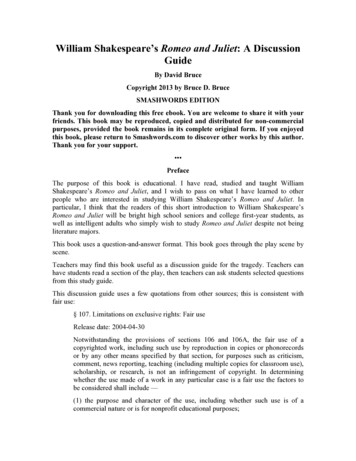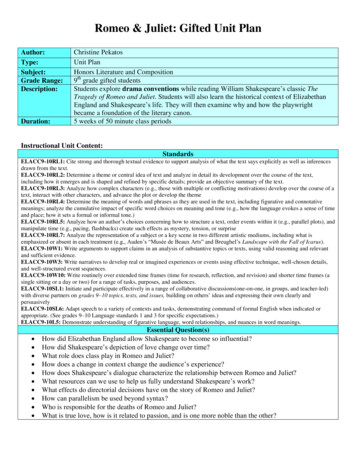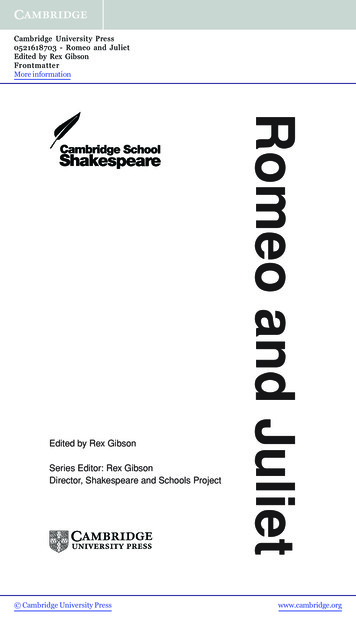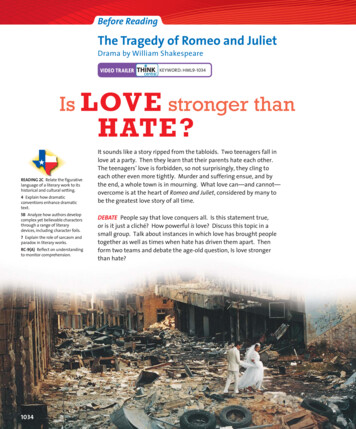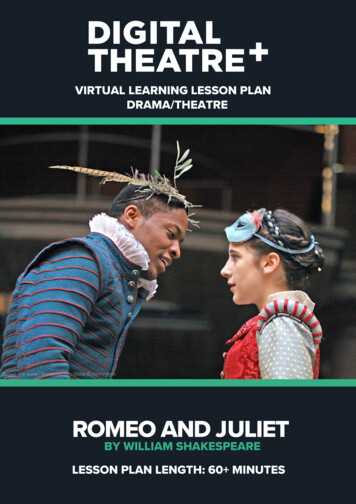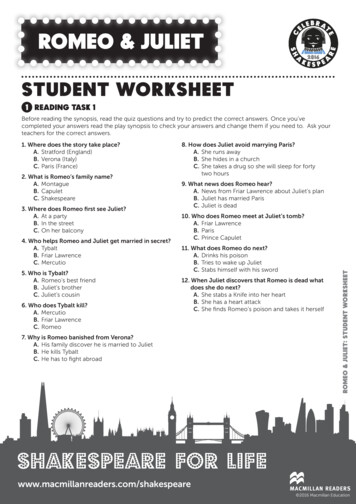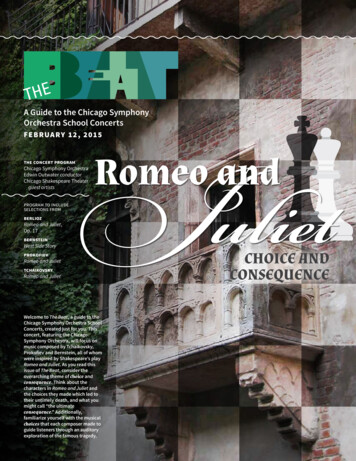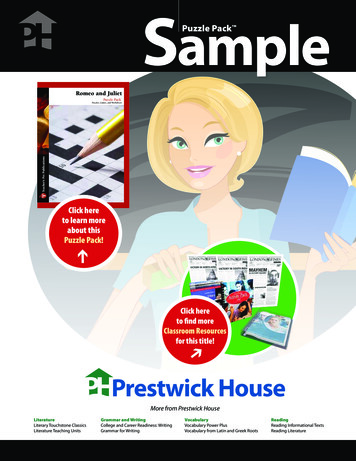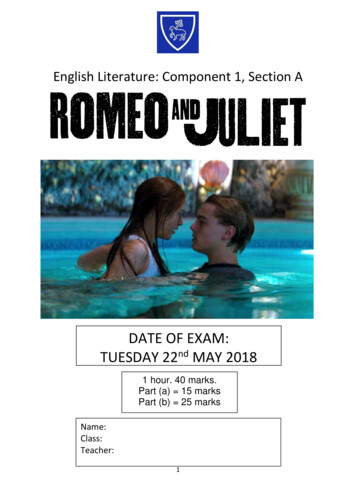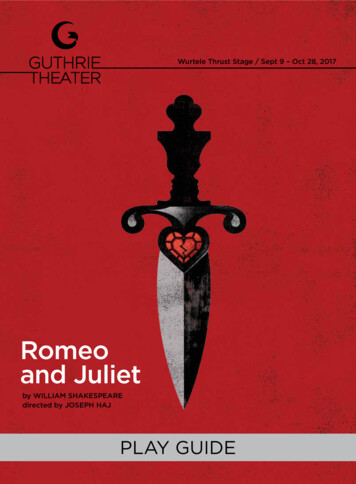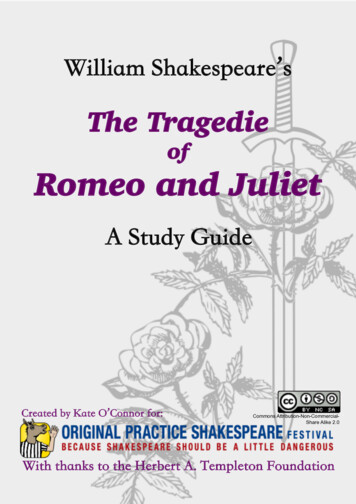
Transcription
William Shakespeare’sThe TragedieofRomeo and JulietA Study GuideCreated by Kate O’Connor for:Commons Attribution-Non-CommercialShare Alike 2.0With thanks to the Herbert A. Templeton Foundation
William Shakespeare’sRomeo and JulietA Study GuidePlot Summary . 2-3Characters . 4Background & Sources . 5Opposites & Antithesis. 6Love & Lust . 7Fate & Free Will . 8Questions for Productions . 9Language of the Play . 10Juliet: A Character Study . 11Classroom Activities (Before the Play) . 12Classroom Activities (During the Play) . 13Classroom Activities (After the Play) . 13-15Further Resources . 16About Original Practice Shakespeare . 18Oregon State Benchmarks Key . 19-20Attribution & Thanks . 21Created by Kate O’Connor for:Commons Attribution-Non-CommercialShare Alike 2.0With thanks to the Herbert A. Templeton Foundation
Plotof Romeoand JulietIn the streets of Verona, a fi゙ght erupts between two feuding families, the Montagues and theCapulets. The Prince intervenes and pronounces a death sentence on the next person toengage in a public brawl. Lady Montague is concerned for her son Romeo, who has beenacting withdrawn. She asks his cousin Benvolio to fi゙nd out the cause of his grief. Romeoreveals that he is in love with Rosaline, who will not return his affections.The head of the house of Capulet speaks to Count Paris about his wooing and marrying hisonly child, Juliet. Capulet sends out invitations to a masked ball at his home, and theilliterate delivery man asks Benvolio and Romeo for help. Benvolio persuades Romeo tosneak into the party, and Romeo agrees, eager to see Rosaline there.Lady Capulet broaches the possibility of a marriage with Paris to her daughter Juliet andJuliet’s Nurse. Juliet is surprised, and not interested in marriage, thinking herself too young.Romeo, Benvolio, and their friend Mercutio enter the Capulet revels in disguise (afterMercutio mocks Romeo’s pining for Rosaline). Romeo feels a strange foreboding.At the ball, Romeo sees Juliet and is overcome by her beauty. Tybalt recognizes Romeo andalthough Capulet forbids him to fi゙ght Romeo at the party, Tybalt vows to challenge Romeolater. Romeo and Juliet meet, kiss, and then each discovers the other is the child of theirfamily’s enemy.Romeo slips away from Benvolio and Mercutio after the party and waits beneath Juliet’sbalcony. He overhears her profess her love for him,and offers his own vows in exchange. They plan tomarry the next day.Friar Lawrence meditates on the healing anddangerous properties of plants, when Romeo burstsin and asks for him to perform the clandestinemarriage. The Friar is concerned by Romeo’s suddenshift of attention from Rosaline, but realizes thattheir union might heal the rift between theMontagues and the Capulets.Tybalt has issued challenge to Romeo by letter.Romeo meets his friends in the street, cheerier thanbefore. The Nurse and her servant meet with himand she tells him that Juliet can meet him in theFriar’s cell for their wedding. After much rambling,the Nurse relays Romeo’s agreement back to Juliet.Frank Dicksee’sRomeo and Juliet (1884)Friar Lawrence cautions the young couple about thedanger of their violent, sudden passion, butperforms the marriage.2
PlotofRomeoandJuliet(cont.)Tybalt meets with Mercutio and Benvolio, wanting tofi゙ght Romeo. Mercutio baits Tybalt into a duel. Romeoarrives, now Tybalt’s kinsman because of his marriageto Juliet, and tries to intervene. When Romeo gets inthe way, Tybalt stabs Mercutio under Romeo’s arm.Mercutio curses the houses of Capulet and Montaguealike, then dies. Romeo becomes furious after hisfriend’s death, slays Tybalt, and then fl゚ees.The Prince arrives and declares that Romeo isbanished for having killed Tybalt. Juliet waits forRomeo to sneak in for their wedding night, but insteadthe Nurse arrives with the news of Romeo’s havingkilled Tybalt and his subsequent banishment.Romeo runs to the Friar, distraught. The Friararranges for him to hide in Mantua until Juliet can joinhim, and Romeo visits Juliet for one fi゙nal night. Thenext morning Romeo steals away.Mistaking her grief over Romeo’s departure for griefEdwin Austen Abbey’s The Death of Mercutioover Tybalt’s death, Capulet arranges a marriageRomeo’s Friend (1904)between Juliet and Paris. When she refuses, hethreatens to disown her. The Nurse tells Juliet to consider Romeo dead and accept thissecond marriage. Juliet turns to the Friar for help, who offers her a potion that will makeher appear dead. He sends word to Romeo to retrieve her. When the wedding party arrivesin the morning, Juliet seems dead, and they place her in the Capulet tomb.The Friar’s messenger is waylaid and Romeo receives word from Balthasar that Juliet isdead. He buys poison from an apothecary and heads for Verona. There he encounters,duels with, and kills Paris, who is mourning for Juliet. Romeo bids his farewell, lays byJuliet, and takes the poison. The Friar enters, Juliet awakes, and the Friar runs. Juliet stabsherself.The Capulets, Prince, and Montagues discoverthe bodies, and the Friar reveals the true storyof Romeo and Juliet’s marriage. Capulet andMontague promise to end the feud and build agolden statue of the dead lovers. The play endswith the Prince promising that some will bepardoned and some punished, and says, “Fornever was a Story of more Woe,/ Than this of Juliet, and her Romeo.”Frederic Leighton’s The Reconciliation ofthe Montagues and Capulets over theDead Bodies of Romeo and Juliet (1855)3
CharactersCapulets:inRomeo and JulietJuliet – The only child of the Capulet family, Juliet falls in love with Romeoand marries him despite their families’ feudCapulet – Juliet’s commanding and stern father, head of the house of CapuletLady Capulet – Capulet’s young wife and Juliet’s motherTybalt – Juliet’s cousin, a belligerent hotheadNurse – Juliet’s nursemaid, a verbose and bawdy womanPeter – The Nurse’s servantCousin Capulet – A relative who attends the Capulet ballSampson – A servant of Capulet who brawls in the fi゙rst sceneGregory – A servant of Capulet who brawls in the fi゙rst sceneClown – An (illiterate) servant, frequently doubled with Peter in performancePetruchio – A friend of TybaltRosaline– Though never seen on stage, Romeo is wooing Rosaline withoutsuccess at the start of the playMontagues:Romeo – The son and heir of the house of Montague, who secretly weds JulietMontague – Romeo’s father, head of the house of MontagueLady Montague – Montague’s wife and Romeo’s motherBenvolio – Romeo’s cousin and friend, a voice of reason throughout the playBalthasar - A servant of Montague who brawls in the fi゙rst scene and who bringsRomeo the news of Juliet’s deathAbram – A servant of Montague who brawls in the fi゙rst sceneUnaffi゙liated Characters:Prince Escales – Prince of Verona, charged with keeping the peaceMercutio – A relative of the Prince and friend of Romeo and Benvolio, quickwitted and scrappyParis – Another relative of the Prince, Capulet hopes Paris and Juliet will wedPage – A messengerFriar Lawrence – The friar who agrees to marry Romeo and Juliet in secretFriar John – The friar who is meant to deliver the message to Romeo that Julietis not really deadApothecary – The chemist who sells Romeo poisonMusicians – The musicians who jest after Juliet’s supposed death4
Background & SourcesWritten: !c. 1595-6!Published:!1597!First Recorded Performance: !1662!After: !The Comedy of Errors!Before: !King John,!The Merchant of Venice!Concurrent:!A Midsummer Night’s Dream!Line Count: !2989!Source TextWilliam Shakespeare’s The Tragedie of Romeoand Juliet is based on an old Italian tale, butmore recently on a popular verse translation ofthe story by Arthur Brooke published in 1562,titled The Tragical History of Romeus andJuliet. In 1567, William Painter retold the storyin prose and published it under the name Palaceof Pleasure. Shakespeare’s theatrical adaptationwas a commercial triumph, frequently revivedfor performance in Shakespeare’s day. The playwent through at least two printed editionsbefore the publication of the First Folio in 1623.Traditions of Courtly LoveAs Shakespeare wrote Romeo and Juliet, he was aware of the Medieval literarytradition of “courtly love.” Courtly love was a way of expressing love in a noblemanner, and often involved a man writing poetry about or wooing a distant,unattainable, or aloof woman. The literary convention involves a lot of elegant,fl゚owery, and even hyperbolic language. How do we see this tradition at work in thesecond half of the fi゙rst scene when Romeo pines for Rosaline? And how doesShakespeare turn that tradition on its head later in the play?Romeo and Juliet &A Midsummer Night’s DreamAt approximately the same time Shakespeare was writing Romeo and Juliet, he wasalso writing A Midsummer Night’s Dream. If you are familiar with Midsummer,consider in what ways the plays, though of dramatically different genres, are similar.How could Hermia and Lysander have ended up like Romeo and Juliet? How couldRomeo and Juliet have found Hermia and Lysander’s happy ending? What aboutthe play-within-a-play in Midsummer, Pyramus and Thisbe? The mechanicalsdescribe the play as “The Most Lamentable Comedy and Most Cruel Death ofPyramus and Thisbe.” In what ways could Romeo and Juliet be described as alamentable comedy? Do you prefer Romeo and Juliet or A Midsummer Night’sDream? Why?EL.HS.LI.01EL.HS.RE.02AR.HS.AC.025
Themes of Romeo and JulietOppositions and AntithesisIt is fi゙tting that a play that begins with a street brawl isoverfl゚owing with images of duality, opposites, antithesis,and oxymoron. As you watch or read the play, use the box tothe right as a guide for what common juxtapositions forwhich you may want to be on the look out.Consider Friar Lawrence’s fi゙rst appearance in the play inAct II Scene 3: he appears at dawn, just as night becomesmorning. As he works his way through his garden, hediscusses the properties of various plants, some of which canheal and some of which can /Hate!Love/Lust!Love/Violence!Fate/Free h for when these opposites occur even in the samephrase, such as “loving hate” (I.i), “This holy shrine, thegentle sin” and “love a loathed Enemy” (I.v), or “Lovedevouring death” (II.vi). How does the day/nightconversation between Romeo and Juliet in Act III scene 5prove a source of both humour and foreshadowing? Choose one of these pairings and trace itsoccurrence throughout the play, thenconsider what literary purpose it serves.Just as the play is full of opposites, it also is full ofparallels. Think about the following characters and howthey mirror or resemble one another: Capulet &Montague, Mercutio & Nurse, Friar Lawrence & Nurse,Rosaline & Juliet, and Benvolio & Tybalt.Questions for Discussion1. What other oppositions not listed here do younotice throughout the play?2. Are there points at which a certain antithesisdominates a scene or act?3. How do the thematic oppositions relate to theplot of Romeo and Juliet?4. Could any of the concepts suggested aboveappear in the play as effectively without thepresence of its opposite?5. Are there any moments in the play where purelove is depicted, untouched by the opposition ofBenvolio and Tybalt face off in the streets of Veronaviolence, hate, or even death?Photo credit: Dayle Nelson EL.HS.LI.10EL.HS.RE.06EL.HS.RE.116
Themes of Romeo and JulietLove and LustROMEO Thou chid’st me oft for loving RosalineFRIAR For doting, not for loving pupil mine. Act II, Scene iiiHow does the play distinguishBetween Romeo’s doting (or lust) forRosaline when we fi゙rst meet him and his true love for Juliet? A great deal of theanswer lies in the language. Despite the poetic nature of Romeo and Juliet’sexchanges, they are in many ways less over the top than his descriptions of Rosaline.How do you think Shakespeare makes the difference between doting and loving clear?Contrasted with the innocence of the lovers, we have the bawdy bandying of characterslike Mercutio and the Nurse, who never miss an opportunity for sexual punning. AreMercutio and the Nurse intended to serve as foils for Romeo and Juliet? Romeo gives asgood as he gets in act II, scene 4. Does this fi゙t with the image you formed of his characterprior to reading this scene? WhyJULIET:does Shakespeare place such a heavyI have no joy of this contract tonight,emphasis on sex in the play? Is RomeoIt is too rash, too unadvised, too sudden,And Juliet more about love or lust?Too like the lightning, which doth cease to beEre, one can say, it lightensConsider how many times charactersexpress concern about how quickly Romeo and Juliet fall in love. Their speedyromance and marriage often is expressed using imagery of lightning.Is it possible to love so soon, andso deeply? As an actor or director,how would you convey the extentof their love to an audience ?Where else does the image oflightning appear in the play?Who expresses concerns aboutRomeo and Juliet’s hastywedding, and what imagery orsimiles do they use?And if both Romeo and Julietexperience fear and foreboding,why do they go forward with thesecret marriage?Romeo and Juliet meet at the Capulet ballPhoto credit: Tim Lewis EL.HS.RE.117
Themes of Romeo and JulietFate, Destiny, & Free WillJuliet seeks Friar Lawrence’s ominous counsel after her forced engagement to ParisPhoto credit: Tim Lewis (2012)The prologue of the play tells us thatRomeo and Juliet are star-crossed; it iswritten in the stars, or destined, thatthey will kill themselves before the playruns its course.Do you believe that their fates couldnot have been avoided? If not, whichcharacters could have made differentchoices, and when? How would thesechoices have altered the outcome of theplay? Why do you think Shakespearechose to make this play a tragedy?EL.HS.LI.05EL.HS.LI.09ROMEO:I fear too early, for my mind misgives,Some consequence yet hanging in the stars,Shall bitterly begin his fearful dateWith this night’s revels, and expire the termOf a despised life closed in my breast:By some vile forfeit of untimely death.But he that hath the steerage of my course,Direct my suit: on lusty Gentlemen.As you read or watch the play, look forlanguage comparing characters’ lives to asea voyage. How does this image enhanceor undermine the idea that Romeo andJuliet’s fates are predestined?EL.HS.LI.14EL.HS.RE.11EL.HS.RE.218
Questions for Productions“For sweet discourses in our time to come”! In 1994, a Palestinian theatre and an Israeli theatre came together to produce Romeo and Julietwith the Israelis as Capulets and Palestinians as Montagues. In this production, they cut act Iscene 1 (the public brawl). Why do you think the directors might have chosen to do this? Canyou think of other historical or modern parallels to the feud between the Montagues and theCapulets? Where and when would you set your production?! Mercutio is one of the most-loved characters in the play, but his belligerence sets off adangerous chain of events. What are his strengths? What are his fl゚aws? What purpose does hisQueen Mab speech serve? Does Mercutio’s plague on the two houses take hold?! Can true love be expressed convincingly on stage or on fi゙lm? In your opinion, does it exist? Whatabout “love at fi゙rst sight”?!"At the end of Act 4, Scene 5, after the Capulets discover Juliet’s body, there is an exchange of!"If you read the play before seeing the production, did any moments surprise you by beingfunnier than you expected? If yes, then what made them so? Is Romeo and Juliet a funnyjokes between the servant Peter and the musicians hired for the wedding. What purpose doesthis interlude serve? Why do you think Shakespeare included it? If you were a director, wouldyou cut or keep the scene?play, as well as being a tragedy?!"How do you imagine the play would be different when performed by an all-male cast, as it would!"Choose your favorite linehave been in Shakespeare’s day?from the play beforeattending the OPSFestproduction. Does how theactor speaks the linechange your understandingof the o, Mercutio, and Benvolio in an OPS productionPhoto credit: Dayle Nelson (2012)9
Language in Romeo and JulietSonnets and the Language of LoveShakespeare offers us two instances of Romeoexpressing romantic feelings: fi゙rst with Rosaline,and then with Juliet. Regarding which woman ishe more formal in his language? How does theword choice or style of speech differ between howRomeo and Juliet express his or her love?Take a look at this passage from whenJuliet and Romeo fi゙rst meet at the ball.What do you notice about theirdialogue, when you ignore the speechtags and read the text as a whole?What do you make of the religiousimagery than runs throughout theexchanges between Romeo and Juliet,both at their fi゙rst meeting and duringthe balcony scene?Do you consider Romeo and Juliet’sdialogue to be realistic? At what pointdo the lovers switch to more formallanguage, or even jump from verse toprose? What different effects do verseand prose have for you as an audiencemember or EL.HS.RE.26Shakespearian Sonnets!Shakespearian sonnets are made up offourteen lines of iambic pentameter (tensyllables, with every second syllable stressed).They have three quatrains (groups of fourlines) and a final couplet. They follow thisrhyme scheme:!ABABROMEO JULIET ROMEOJULIETROMEO RE.12EL.HS.SL.17What’s in a name?!Juliet claims, “That which we call a rose byany other name would smell as sweet” (II.ii).Are these characters aptly named?!Benvolio – benevolent, well-wishing!Mercutio – mercurial (changeable), andrelated to the trickster god Mercury!Juliet – youthful!Tybalt – brave, the name of a cat in theReynard tales!CDCD!EFEFGG!If I profane with my unworthiest hand,This holy shrine, the gentle sin is this,My lips two blushing pilgrims did ready stand,To smooth that rough touch, with a tender kiss.Good pilgrim, You do wrong your hand too much,Which mannerly devotion shows in this,For Saints have hands, that pilgrims’ hands do touch,And palm to palm, is holy Palmer’s kiss.Have not Saints lips, and holy Palmers too?Ay pilgrim, lips that they must use in prayer.O then dear Saint, let lips do what hands do,They pray (grant thou) lest faith turn to despair.Saints do not move, Though grant for prayers’ sake.Then move not while my prayer’s effect I takePunsRomeo and Juliet is packed full of puns,homophones, and wordplay, especially inMercutio’s dialogue. Take a look at some of thedouble meanings from Shakespeare’s day that youmay not recognize now:Slip counterfeit coin, escapeCase Situation, genitalsGoose Bird, nitwit, prostituteLight Source of light, not heavy, sexually looseMarry Indeed, wedWhat other wordplayCollier Coal vendorcan you spot inCholer Angerthe play?Collar Noose (for hanging)10
JulietA Study in Character DevelopmentJuliet often is cited as the character whoundergoes the most dramatic change inpersonality and maturity during the course ofthe play. When we fi゙rst meet her in act I, scene3, she seems meek, obedient, and speaks only afew lines. She is only 13 years old, and faces adistant mother and a garrulous Nurse.In their exchange at the ball, Romeo takes thelead. However, by the time he meets her at herbalcony, she seems to have grown linguisticallyand emotionally. This Juliet transformed bylove is quick-witted, able to recognize thedanger of a lightning romance, but she is alsocapable of tremendous depth of feeling.Thou vs. YouDid you know that there’s a big differencebetween calling someone thou or thee andcalling someone you? In Shakespeare’sday, thou was an informal address and youwas a formal address.Take a look at Lady Capulet speaking toher daughter in act I, scene 3. Where doesshe switch between the pronouns she usesto address her daughter? What hints doesit give you about their relationship?“My bounty is as boundless as the Sea,My Love as deep, the more I give to theeHe more I have, for both are Infi゙nite”This elegant language is leagues away fromRomeo’s melodramatic pining for Rosaline at thestart of the play. Consider, too, how Juliethandles herself when crisis comes. She turns herback on the closest thing to a mother she hasknown (the Nurse) and condemns the Nurse’ssuggestion that she accept a bigamous marriage.Instead, Juliet faces the Friar’s potion withunabashed courage. Is this like the 13-year-old wesaw at the outset?Prompts:1. As a director, how would you coach theactress playing Juliet through thistransformation?2. Would you highlight or play down herchildishness in her fi゙rst scene?3. Do you believe it is love that transformsJuliet?4. How much of the characterization ofJuliet depends on the mood and tone indelivery of the lines by the actress?AR.HS.CP.02John William Waterhouse’s “Juliet” (1898)EL.HS.WR.0311
Classroom Activities: Before Seeing the PlayThe PrologueBefore the play begins, the ending is revealed in Shakespeare’s prologue. Students can bedivided into groups and asked to act out a dumbshow or mime of the events of the play asthey are revealed in the prologue, with at least one action or pose per line of verse.Two households, both alike in dignity,In fair Verona where we lay our scene,From ancient grudge break to new munity,Where civil blood makes civil hands unclean.From forth the fatal loins of these two foesA pair of star-crossed lovers take their life,Whose misadventured piteous overthrowsDoth with their death bury their parents’ strife.The fearful passage of their death-marked love,And the continuance of their parents’ rage,Which but their children’s end, naught could remove,Is now the two hours’ traffi゙c of our stage;The which if you with patient ears attend,We hear shall miss, our toil strive to mend.A Note on the Prologue: Many scholars believe that the prologue was only performed inthe fi゙rst ever production of Romeo and Juliet. It is not included in the Folio text of the play,the collected works of Shakespeare published after his death.Refl゚ecting on the activity:1.2.3.4.5.6.7.What does your mime suggest will happen in the play?How did each group’s mimes differ from one another’s?After seeing the play, what important plot points do you notice are excluded from theprologue? Why do think Shakespeare chose to omit them?How much of the story of the play did you already know before reading the text orwatching the play? How did the prologue support or defy your expectations?Why did Shakespeare choose to place a prologue at the beginning of the play thatreveals the play’s ending? Do you think it was included in later shows in ElizabethanEngland?How do you feel about the chorus that speaks between Acts 1 and 2? Why do youthink that choral interlude is frequently cut in modern performances? Would youinclude it, or the prologue, if you were directing the play?After seeing the play, why do you think OPSFest does not include the prologue in .HS.AC.0112
Classroom Activities: During the PlaySpot the ReferenceMany of the lines from Romeoand Juliet are so well-known as tohave become everyday phrases. Asyou watch the play, take note ofwhatever phrases you have heardbefore.What other forms of art can youthink of (songs, operas, ballets,paintings, poems) that Romeo andJuliet has inspired?Carl Thorborg’s photo of Nadja Sellrup and Pascal Janssonin the Romeo and Juliet ballet, performed in 2010 at theRoyal Swedish Opera (sourced from wikicommons)Classroom Activities: After the PlayFacebook StatusesSix of the crucial characters in the play (Romeo, Juliet, Mercutio, Benvolio,Tybalt, and Paris) are young, fashionable people of Verona. It’s a pretty safeassumption that if they lived in the modern era, they would use Facebook. Thecharacters’ Facebook statuses could give us a glimpse of what they’re thinking,what they’re feeling, and how they wish to be perceived at a given moment inthe play.Write 1-2 sentence Facebook statuses for some of the characters, eitherresponding to a specifi゙c moment in the text, or presenting their general feelingsand attitudes.What comments or ‘likes’ might these updates illicit from friends and familymembers? Can you re-construct the story of Romeo and Juliet through the statusupdates of different characters?Can you compress your statuses into the 140 character maximum for a HS.CP.02 EL.HS.LI.0315
Classroom Activities: After the Play“Some will be pardoned, and some punishèd.”At the end of the play, the Prince declares that in light of the deaths of Romeo and Juliet,“Some will be pardoned, and some punishèd.” Imagine that you have been assigned to headup the inquest to determine responsibility or fault in the cases of the six deaths of the play(Mercutio, Tybalt, Lady Montague, Paris, Romeo, and Juliet).Take turns, with different members of the class acting as a character or as the investigatorwho puts questions to each witness. Then decide, as a class, who should be pardoned andwho punished (and to what extent). Suggested characters and possible sample questions toget the deposition started are listed below.Friar Lawrence(“Why did you leave Juliet alone in the tomb once she awoke and found Romeo dead?”)The Nurse(“Why did you urge Juliet to accept a bigamous marriage with Paris?”)Tybalt(“Why did you feel it necessary to fi゙ght Romeo?”)Mercutio(“Why did you incite Tybalt to fi゙ght, even though you are not affi゙liated with either house?”)Romeo(“Why did you kill Tybalt, despite his being your kinsman?”)Capulet/Montague(“Do you believe the family feud that you allowed to continue killed your children?”)The Prince(“As the authority responsible for Verona, why did you permit this feud to continue?”)The Apothecary(“Why did you have illegal poison available for sale?”)Refl゚ecting on the activity:1. Who did you determine to be most at fault? Were the deaths simply the result of fate oraccident?2. For those you deemed responsible, what would you consider to be appropriatepunishments?3. How did it feel to portray one of the characters defending or explaining his or heractions?4. What emotions were brought up by this activity? Did the questions become aninterrogation?5. In Shakespeare’s source, the poem by Arthur Brooke, the Nurse is banished, theApothecary hanged, and Friar Lawrence becomes a hermit. Are these apt fates?6. How do you feel about Shakespeare’s choice not to depict consequences for thesurviving characters?EL.HS.SL.10EL.HS.RE.25 EL.HS.RE.26 EL.HS.LI.05EL.HS.LI.1013
Classroom Activities: After the PlayPerspectives: Re-writing the PlayGet a new perspective on the play by re-writing it in a new form,from a new point of view. Consider: Trying to relate the plot in only 50 words Writing the story of Romeo and Juliet as a fairy tale Writing a newspaper article describing the events of the play orone major event in the play Writing a tabloid article about the sudden engagement of Julietand Paris, including scandalous speculations Writing the obituary of one of the characters who dies (Mercutio,Tybalt, Lady Montague, Paris, Romeo, and Juliet) Writing a letter as one of the surviving characters, relaying anevent from or the happenings of the play to a friend or familymember who lives far from Verona Writing up a formal peace treaty between the houses of Capuletand Montague Describe an alternate ending to the play, beginning from whatyou consider to be a crucial point that could shift the story fromtragedy to comedy Write a scene in which Romeo tries to woo Rosaline, consideringhow his interactions with her would differ from his interactionswith Juliet1. Do any of these new ways of framing the play change yourperspective or provide you with additional insight into Romeo andJuliet?2. Would the story have been as effective if told in a form otherthan a P.02EL.HS.RE.20EL.HS.WR.0314
Romeo and Juliet ResourcesProfessor Peter Saccio’s lecture on Romeo and Juliet for NorthernStage meo-and-juliet-athenalecture-6013393Folger Shakespeare Library’s Romeo and Juliet teaching modules:http://www.folger.edu/template.cfm?cid 2779The National Theatre’s Romeo and Juliet Education meo-and-julieteducation-pack/The Royal Shakespeare’s Company Romeo and Juliet teacher nk/romeo-andjuliet/teacher-packs/Clips from the RSC’s production via tmlShakespeare’s Globe Playing Shakespeare Romeo and Juliet website:http://2013.playingshakespeare.org/Harold Bloom, ed. Bloom’s Modern Critical Interpretations: Romeoand Juliet. Philadelphia: Chelsea House Publishers, 2000.Marjorie Garber. “Romeo and Juliet.” Shakespeare After All. NewYork: Anchor Books, 2004.James N. Loehlin, ed. Romeo and Juliet (Shakespeare inProduction). Cambridge: Camb
William Shakespeare’s The Tragedie of Romeo and Juliet is based on an old Italian tale, but more recently on a popular verse translation of the story by Arthur Brooke published in 1562, titled The Tragical History of Romeus and Juliet. In 1567, William Painter retold the story in
